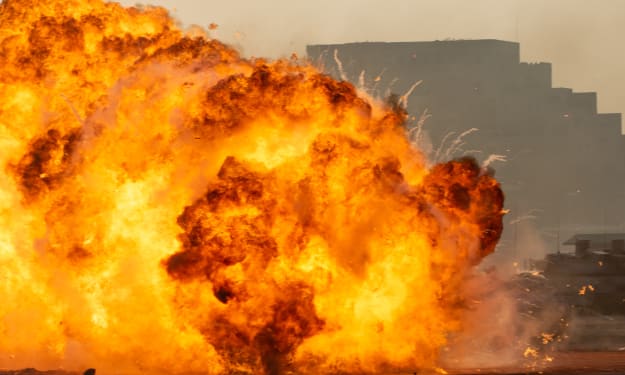
In war, civilians can unfortunately also be targeted and it is vital for them to understand how to defend themselves against explosive weapons. These weapons affect wide areas and can injure and kill people. If the attack is prolonged, the structure of buildings can be damaged, which in turn can lead to injury of the civilians who hide inside. Usually, during a war, there is no more water, electricity, or gas supply and people have little possibility to find food and water to survive. If staying in a basement could give a certain amount of safety, the lack of water and food will force people to venture outside, therefore exposing them to attacks with explosive weapons.

Explosive weapons are dangerous because of several factors, like the blast, thermal effect, and fragmentation. These three factors occur around the point of detonation. The blast itself injures humans and hits buildings, damaging their structure. The shock wave may cause ruptured eardrums, therefore, if possible, try to cover your ears and open your mouth to prevent this injury from happening. Shock can also cause damage to internal organs, which can lead to internal bleeding. Traumatic brain injury can also result from the blast and this may have different effects, such as headache, nausea and vomiting, seizures, loss of consciousness, or even death, depending on the area on the brain that was damaged, and on the force of the impact.
The thermal effect causes heat and burns. If there are any flammable substances around the detonation point, they can cause further explosions, so be aware of those secondary potential dangers, as well.

Fragmentation inflicts wounds, by means of the flying fragments of the bomb, as well as by various objects from the environment, which are propelled through the air due to the blast. They represent a great danger to civilians because they can injure or kill. A second danger related to fragmentation is represented by the infection of the wounds, which can lead to septicemia and death if left untreated. Given the fact that in times of war, the access to doctors and medical facilities is limited, and there is a reduced supply of medicines, the wound infection poses a danger that is just as high as the injury itself.
If you are in a building and the area is attacked with explosive weapons, it is recommended to hide in a safer place, with no windows or walls that can be broken by the blast. A basement could provide safety. Yet, if you decide to go to the basement, do not use the elevator, use only the stairs, because they are safer. If you decide to remain inside the house, take refuge under pieces of furniture that seem resistant and stay away from the windows, because they are going to be the first to break, and you will be injured by the fragments of broken glass. If possible hide in a room without windows.

If you know the location of the bomb shelters in your region, hide there, because these shelters are specially designed to have an emergency exit, so that, if due to the explosion, the main exit is blocked, civilians can escape through the second exit. The emergency exit is usually small, so people will have to crawl through it. If you suffer from claustrophobia, crawling through a small tunnel, especially during an attack, when everybody feels anxiety, might make an escape more difficult. Therefore try to keep as calm as possible in such a situation.
A real danger is represented by the thermobaric bombs. Unfortunately, this type of bomb is harmful to people inside tunnels or underground shelters, because it has two charges instead of only one. The first charge scatters a flammable fuel, which can enter through small spaces, into basements and tunnels. A second charge detonates this fuel, thus injuring and killing even people who are hiding in bomb shelters, if these are not totally sealed.






Comments
There are no comments for this story
Be the first to respond and start the conversation.